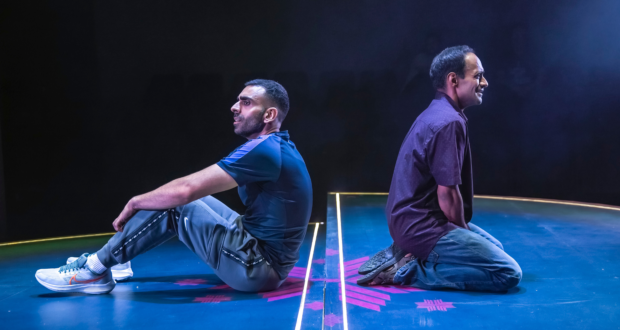Powerful story of a gay Pakistani fleeing homophobic persecution to seek asylum in the UK.Summary
Rating
Excellent
Interviewed prior to this debut production of his play, writer/performer Waleed Akhtar said of its origins: “I wanted to see a play from a queer Muslim perspective that didn’t pander to the white gaze. So, I had to write it.” It’s not uncommon for actors to create work for themselves, born of frustration with the scripts presented to them, and I was intrigued to see what Akhtar’s view of sexuality, race and religion would reveal to me (a white gay aetheist).
There’s certainly plenty of frank talk about sex and race in the play’s opening scenes. Akhtar plays second generation British Pakistani Bilal, a gym-fit promiscuous gay lad who prefers to be called Billy so as not to draw attention to his ethnicity. He’s pleased that he’s not immediately identifiable as Pakistani: “I’m like the best version of brown. I’m not even into Pakis and I’d probably hook up with myself.” But Billy’s preference is for “a twinky little white boy”, and when we first meet him he has met just such a hook-up on Grindr.
On the other side of the revolving geometric platform that forms the play’s set we find Zafar (Esh Alladi). Whereas Billy’s sexual appetite is beginning to show signs of morphing into a desire for companionship, Zafar met the love of his life early on and sustained that relationship – albeit in strict secrecy – until it was recently uncovered. Zafar was then brutally beaten, his lover murdered, and Zafar narrowly escaped from Pakistan on a stolen passport. Heading to the UK in the hope of sanctuary from bloodthirsty prejudice, and with his grief ever present in his mind, Zafur couldn’t be more different to the cock-sure Billy.
I doubt anyone would expect a play about the UK immigration process to depict it in a flattering light. We’re daily alerted to accounts of how unyielding and unsympathetic the system is, seemingly inspired by right wing paranoia about preserving the sanctity of our geographical borders at the expense of our moral integrity. Still, it’s a shock when on landing in the UK Fazar asserts his asylum seeker status on the grounds of homophobic persecution and is suspiciously asked if he’s “Top or bottom?” Unable to prove his sexuality to the satisfaction of the authorities, Fazar’s application is rejected. We meet him while he’s appealing the decision, living on a pittance, forbidden from working and enduring a miserable existence in a land seemingly devoid of compassion.
It’s at this point that teetotal practising Muslim Fazar bumps into boozing non-observant Billy at London Pride, and that dramatic stalwart the “unlikely friendship” begins. The awkwardness of their difference (Billy: “I don’t fuck Pakis, alright?) and Fazar’s objection to Billy’s flippant use of the racial slur that gives the play its title are soon smoothed over and a sweet platonic relationship builds between the two men. Bonding over Bollywood and gradually revealing personal details of their respective histories, it’s a pairing that feels authentic and instructive, as each learns something from the other. There’s a lovely moment during a trip to Brighton when Fazar gives Billy a present of an embroidery we’ve seen him working on in earlier scenes – a symbol of cultural heritage twinned with a very current new relationship, which the two actors play with pitch perfect sensitivity.
The final act elevates a good play to the level of a great one, as Billy steps up to perform an act of audacious bravery for his friend. I won’t spoil it by mentioning details, but it’s a tremendously powerful scene, affirming the value of courage, compassion and community. Then just when you think Akhtar has brought his play to a superbly effective climax, he adds a coda that starkly repositions the ending, bringing it bang up to date and nailing down its absolute relevance.
I hope Akhtar feels he’s succeeded on his own terms with this excellent work. I can only conclude by saying that for me the play’s unquestionable humanity is its trump card, and that the white gaze of this reviewer was blurred by tears of anger tinged with hope.
Written by: Waleed Akhtar
Directed by: Anthony Simpson-Pike
Produced by: Bush Theatre
The P Word plays at Bush Theatre until 22 October. Further information and bookings can be found here.
 Everything Theatre Reviews, interviews and news for theatre lovers, London and beyond
Everything Theatre Reviews, interviews and news for theatre lovers, London and beyond



